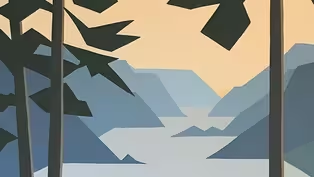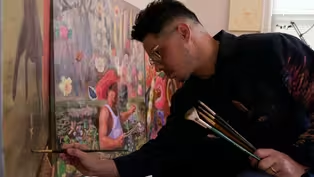Oregon Art Beat
Fullbright
Clip: Season 26 Episode 2 | 6m 43sVideo has Closed Captions
Game creators Steve Gaynor and Karla Zimonja created the critically acclaimed game "Gone Home,"
Indie video game creators Steve Gaynor and Karla Zimonja created the critically acclaimed game "Gone Home," subverting the definition of what a video game should be.
Problems playing video? | Closed Captioning Feedback
Problems playing video? | Closed Captioning Feedback
Oregon Art Beat is a local public television program presented by OPB
Oregon Art Beat
Fullbright
Clip: Season 26 Episode 2 | 6m 43sVideo has Closed Captions
Indie video game creators Steve Gaynor and Karla Zimonja created the critically acclaimed game "Gone Home," subverting the definition of what a video game should be.
Problems playing video? | Closed Captioning Feedback
How to Watch Oregon Art Beat
Oregon Art Beat is available to stream on pbs.org and the free PBS App, available on iPhone, Apple TV, Android TV, Android smartphones, Amazon Fire TV, Amazon Fire Tablet, Roku, Samsung Smart TV, and Vizio.
Providing Support for PBS.org
Learn Moreabout PBS online sponsorship(machine beeps) - [Kaitlin] Hi, Mom.
So I got my ticket home from Europe.
I get back on June 6th, but it's a really late flight.
(rain whooshing) - "Gone Home" is a story exploration video game that takes place in 1995 in a house in Oregon.
And you arrive there one night and find that your younger sister has gone missing effectively.
- [Sam] Don't be worried, okay?
We'll see each other again someday.
- [Narrator] "Gone Home" was one of the most successful video games of 2013.
And it started with a company called Fullbright.
- I'm Karla Zimonja.
I'm one of the co-founders of Fullbright.
- And I'm Steve Gaynor.
I am one of the other co-founders of Fullbright.
- Wow!
- [Steve] I grew up playing tons of video games and as I was getting through college and getting into what am I going to do for a job, I realized that games as a media really spoke more to me than other things that I was engaging with.
- [Narrator] After college, Steve went to work for the big name video game publisher 2K in California.
- So I was building, you know, the spaces that the players would explore while they were playing.
- [Narrator] He eventually became the lead designer for the game "Minerva's Den," where he met Karla.
- I went to school for animation and I worked in television for a couple of years.
A friend of mine was like, "We need help animating all these monsters."
And I was like, "I can do that.
I'm pretty sure."
(soft upbeat music) - [Narrator] The two colleagues decided to try their luck at creating smaller, personal games.
They formed a small team and moved to Portland.
- We rented a house in the Hollywood district and the three of us- - All together to save costs.
- Yeah.
The three of us who worked at the company and my wife Rachel.
Rachel is from Portland and we all just lived in the house and then our office was in the basement.
- [Narrator] That's when they created "Gone Home."
- The entire experience of the game is exploring this house, exploring this old Victorian manor, finding clues and hints on what the family has left behind to figure out what really happened in your absence and kind of rebuild this story as you explore.
(door creaks) - [Narrator] Building a game where you walk around and explore an empty house.
Sounds simple, right?
Well, not exactly.
The team was working with a smaller budget, which meant that they couldn't rely on fancy graphics and fast and furious action.
So they focused on making a good story and a one of a kind immersive experience.
- We wanted to make something that felt authentic and that felt like it really took place in our own world.
And to say it takes place in 1995 in a small town in Oregon, not just a house somewhere.
And that allowed us to really pull on things that we were familiar with and say, "Okay, in the story, the characters that are in high school, they go on a field trip to Multnomah Falls.
- [Sam] Lonnie and I snuck off on the side paths at Multnomah Falls and got a little lost.
Okay.
A lot lost.
(rain whooshing) - We really depend on the player meeting us halfway for the whole game because so much of the work in the game is interpretive.
- [Narrator] In other words, the clues are there, but it's up to you to find them all and piece the story together.
- [Sam] Lonnie came over today, but everything was different.
- [Steve] So we wanted to tell a smaller, more personal story that used the audio diary mechanic.
You hear this little bit of voiceover from your sister that gives you more context and more of a human connection to what you're finding.
- [Sam] I felt like I was going to cry, but I wasn't sad.
- [Narrator] A smaller budget also meant they had to wear many different hats and find clever workarounds for different problems, (bell dings) Like making their own sound effects.
(drawer whirls and shuts) Fullbright even hired their voiceover artist to be a part of the production team.
- So I just want you to bring it up a little bit more at the end than you did on the last take.
- When you live in one place your whole life, your next door neighbor is kind of like your default friend.
And they- - It's funny hearing Sarah's voice in this game because now Sarah works at the studio as a producer and office manager.
So we hear her every day, but not as the voice of Sam Greenbrier - [Narrator] "Gone Home" resonated with critics and fans alike and the gaming industry took notice - And the Choice Award for Best Debut belongs to the Fullbright Company.
(crowd cheers) - [Narrator] And hailed it as the future of interactive storytelling.
- Very unexpected that the game would hit that much of a nerve with people when it came out that we would have our work recognized in that way.
Thank you to all of our family and friends that have given us so much support over this process.
And thank you.
We made something very small that we wanted to have, be able to be kind of impactful to people when they played it, but .
.
.
- It's a small personal story.
- Right.
- [Sam] And get in your car and come find me, and let's just drive until we find somewhere for us.
- [Steve] It was not something that we expected, but it's something that we were very grateful to have been involved with.
(light clicks) (thunder booms) (no audio) - [Announcer] Oregon Art Beat shares the stories of Oregon's amazing artists and member support completes the picture.
Join us as a sustaining member at opb.org/video.
Video has Closed Captions
Clip: S26 Ep2 | 11m 58s | Nancy Houfek Brown did not discover her signature abstract painting style until her 60s. (11m 58s)
Video has Closed Captions
Clip: S26 Ep2 | 8m 25s | Painter Orlando Almanza’s lush images celebrate his childhood in the Cuban countryside. (8m 25s)
Providing Support for PBS.org
Learn Moreabout PBS online sponsorshipSupport for PBS provided by:
Oregon Art Beat is a local public television program presented by OPB

















